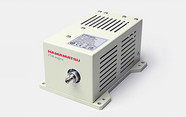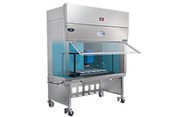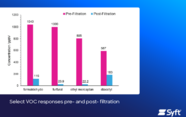Abstract
The coffee roasting process produces particulate matter (PM), volatile organic compounds (VOCs), and other gaseous emission products (U.S. EPA (1995)). It is common for companies to employ an afterburner or filtration device to reduce or eliminate the presence of these species in the roasting system exhaust. Alternative technologies to afterburners provide potentially similar filtration capabilities without requiring fossil fuel consumption. Selected ion flow tube mass spectrometry (SIFT-MS) is a technology which offers real-time data for ambient air sampling over a wide range of VOCs. SIFT-MS was used to detect and quantify volatiles in the roastery exhaust stream before and after a wet scrubber filtration system from VortX KleanAir Systems Inc. (San Rafael, CA). Twentysix VOCs were simultaneously monitored during coffee bean roasting from three locations: the roasting room air, the exhaust stack (pre-filtration), and the exhaust exit (post-filtration). The results showed significant reductions (3-62-fold) in emissions following the wet-scrubber filtration. SIFT-MS provides an easy-to-use solution for reliable real-time emissions testing data that enables critical business decisions to be made quickly.
Introduction
Coffee remains an incredibly popular drink throughout the world. The coffee roasting process is known to produce several undesirable by-products ranging from carcinogens, odorous compounds, and particulate matter. Afterburners are typically utilized as the Best Available Control Technology (BACT) in roasting plants to mitigate the emission of these products. Alternative filtration technologies, such as wet scrubbers that use water as their primary input, are providing environmentally friendly solutions to the afterburner technology, with significant reductions in fuel requirements and emissions.
Log in or register to read this article in full and gain access to The Analytical Scientist’s entire content archive. It’s FREE!


















